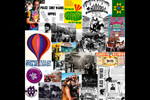Peter Berg
Interview by David Zane Mairowitz, 2007
Contents
Introduction
David Zane Mairowitz has authored numerous books that look at
avant-garde culture. He was living in Berlin when this interview took
place. He and
Peter Berg had never met although Mairowitz had been in
San Francisco during 1967. In one of his first books, titled BAMN (by
Any Means Necessary): Outlaw Manifestos and Ephemera, 1965-70,
Mairowitz had included reprints of several Digger and Free City street
sheets. Berg was impressed by Mairowitz’s compilation of underground
manifestos and recommended it to anyone in the early 1970s who asked
about the Digger movement. After BAMN, Mairowitz wrote Radical Soap
Opera which included his synopsis of the Diggers.
This interview took place by phone in 2007. Mairowitz was working on a
project around the events of May 1968. He explained to Berg that the
interview would be done in the present tense, as if they were speaking
in 1968 about the events taking place in the United States and worldwide
at the time.
Synopsis
Peter Berg, director of the
Planet Drum Foundation, discussed his time with the Diggers.
Berg explained the Diggers' origins in the San Francisco Mime
Troupe, their embrace of provocative tactics like the "Free Store"
and the "1% Free" poster, and their dedication to providing free
services and promoting individual expression as a form of social
change. He contrasted the Diggers' approach with its emphasis on
individual creativity with the more confrontational tactics of
groups like the Motherfuckers. Berg argued that the Diggers' legacy
lived on in movements for social justice and environmentalism, and
he discussed Free City, a 1968 Digger project that extended their
message citywide through events like the occupation of San Francisco
City Hall steps.
Topics Discussed
- Introduction to Peter Berg and Planet Drum
Foundation: Berg’s role as director of an ecological
activist and educational organization focused on promoting
bioregionalism.
- The State of the Haight-Ashbury in the 1960s:
Descriptions of Haight-Ashbury as a hub of countercultural
activity, its secession-like status from the rest of San
Francisco, and the police repression that followed.
- The Digger Movement's Origins and Philosophy:
Discussion of the Diggers’ inspiration from the 17th-century
English Diggers, the San Francisco Digger principle of
“everything is free, do your own thing,” and the emphasis on
anti-materialism and individual freedom.
- Digger Free Services: The Diggers'
projects like the Free Store (“Trip Without a Ticket”), Free
Food programs, and how these initiatives met the needs of the
youth coming to San Francisco.
- The Diggers' Theatrical Approach: How
the Diggers emerged from the San Francisco Mime Troupe and used
Life Acting as a form of social-political theater, transforming
everyday life into a form of participatory theater.
- The "1% Free" Poster: Discussion
about the creation, meaning, and impact of the “1% Free” poster,
symbolizing the provocative and thought-provoking nature of
Digger messaging.
- Free Bank and Free Economy Concepts:
The idea of a Free Bank, how it was enacted in practice (e.g.,
distributing money on the streets), and how this challenged
conventional notions of economy and ownership.
- Differences Between Diggers and Other Radical
Groups: Comparisons between the Diggers and other
anarchist groups like the Motherfuckers, highlighting the
Diggers' emphasis on proactive creativity and community versus
violent protest.
- The Transition to the Free City Collective
(1968): The shift from the Diggers to the Free City
Collective, focusing on occupying City Hall steps and expanding
their activities to other neighborhoods in response to police
repression.
- Impact of the Diggers and Their Legacy:
Berg’s reflections on the influence of the Digger movement on
future social, political, and ecological movements, and how
their spirit lives on in ideas of mutualism and interdependence.
- Anonymity and Collective Action: The
importance of anonymity within the Diggers' work, serving both
as a form of resistance to police surveillance and as a means of
promoting mutuality and interdependence.
- The Digger Film "Nowsreal": A brief
mention of the film documenting the Diggers and their
activities, made anonymously to maintain the spirit of the
movement.
- The Slogan “Today is the first day in the rest
of your life”: Discussion about the meaning and origin
of this slogan, its connection to beat poet Gregory Corso, and
its relevance following the assassination of Martin Luther King
Jr.
- Connections with Other Key Figures and
Movements: Mention of Ronnie Davis, co-founder of the
San Francisco Mime Troupe, and Berg’s encounters with other
influential radicals like Abbie Hoffman and the Situationniste
in France.
The Planet Drum Foundation website has a slightly differently edited version of
this interview, along with an audio file:
here.
The Interview
Interview of Peter Berg by David Zane Mairowitz
October 2007 (via phone)
[Legend | PB: Peter Berg | DM: David Zane Mairowitz]
DM: Peter, what I would like to start with is — would you just tell me
who you are, and what you basically do in life, and so on.
PB: My name is Peter Berg. I'm director of
Planet Drum Foundation, which
is an ecological activist and educational organization. We promote the
idea of bioregions throughout the planet.
DM: Going back into the present tense, what's going on in May 1968,
what's going on in the streets of San Francisco? Tell me what's going on
in the streets outside.
PB: Since late fall in 1967, the police have changed the traffic
patterns so that Haight Street is now a one-way street. They've
installed sort of yellow, yellowish mercury-vapor lights that burn all
night. And they run patrol cars and paddy wagons up and down the street
about every half hour. They're picking up anyone who looks underage or
anyone who they want to pick up to check for identification. Because of
that, they're arresting about 20 people every half hour.
DM: Why are they doing that? What's the problem?
PB: During 1967, the neighborhood of Haight-Ashbury essentially seceded
from the City of San Francisco. If we had had our own water, sewage, and
electricity, we would have been a separate city. It was a little like
the taking of the heights of Paris by the
Paris Commune in the late 19th
century in France.
DM: I've heard a lot about this Haight-Ashbury. What is that whole area?
What's that all about? Can you tell me?
PB: The Haight-Ashbury is the neighborhood in San Francisco that was
first brought to national attention for being the most highly racially
integrated neighborhood. And it was the site in the middle 1960s of the
stopping of freeway expansion. Freeway is the American term for
expressways. One was planned for the middle of this neighborhood. And
the neighborhood and other organizations in the city rejected it. So, it
was the stopping of the freeway expansion, traffic expansion, in the
city — which, by the way now, is very advanced. Freeways are being taken
down in San Francisco now. But then, the stopping of a freeway was a
major social protest. And from that, from those two roots — being
fertile for social protest and being highly racially integrated — the
Haight-Ashbury became a desirable site for the same trend in population
that created North Beach as a beatnik haven in the 1950s. The
Haight-Ashbury became a haven for alternative lifestyle and rebellious
elements in San Francisco. From 1965 through 1967, this increased to the
point that the neighborhood, in terms of population and expansion and
governance — became its own social, political, cultural entity, and the
city simply couldn't stand it. So, the police reacted by trying to stop
the social upheaval that was happening there.
DM: Okay. But what interests us mostly — because that's really the kind
of starting point of Digger — is what the press ridiculously refers to
as the Summer of Love, and so on. But there was a huge run on the city
of San Francisco, especially in Haight-Ashbury in 1967. And we are in
1968. So, what happened there last year?
PB: Oh, it was the crescendo of the alternative culture rebellion in the
United States, throughout the United States, and I believe, Western
industrialized culture. The 1967 period in the Haight-Ashbury was a
triumph of opposition to war; putting forth of more-human values, values
associated with nature; love between human beings; creativity;
expression of individuals; and a disavowal of racism, militarism and
oppression that had been associated with industrial culture. The Diggers
took a particular slant on all of that, basing their philosophy on the
Diggers in England in the 17th century, who reacted to the Enclosure
movement which took land away from agriculturally productive peasants
and turned it into massive sheep farming. Taking their name from that
group, they declared Golden Gate Park and the Panhandle — an extension
of the park that runs through the Haight-Ashbury — as a kind of commons;
and declared, as the Diggers in England had, that everything should be
free and replaced the Protestant ethic of the Diggers with an ethic that
one should do one's own thing. So, the motto of the Diggers was,
“everything is free, do your own thing.” And the goal of the Diggers was
to provide free services and free culture that would inculcate those
values into the people that were streaming into the Haight-Ashbury, at
the rate of about a hundred thousand a year.
DM: So, there is actually a kind of social crisis going on, in the sense
that you've got all these young kids who have descended on the city.
There's nowhere for a lot of them to stay, a lot of them are going
hungry, there is a drug problem. So, what are the Diggers doing about
this?
PB: Well, I think the way you're stating it is the way the Establishment
stated it.
DM: Okay; contradict me.
PB: We saw them as refugees from mainstream America — that mainstream
America, and, by the way, a lot of these people were from other
countries as well, was breaking down. It was not fulfilling the dreams,
aspirations, or hopes of this younger generation. Instead of peace,
love, joy, productivity, creativity, they were being offered war, death,
a money economy, a life of servitude in jobs — rather than a promise of
fulfilling their hearts and their spirits. So, they flocked to the place
where they thought that could be done.
DM: And, what is the response, then, of a group like Digger to their
needs? What are the concrete things that are being done about this?
PB: The foundation of the Diggers was in a radical theater group that
was called the
San Francisco Mime Troupe. It still exists in San
Francisco, and it's associated with Left radical politics and causes.
But approximately 35 or 40 of the members of the Mime Troupe at that
time defected from doing the free theater in the park that we had been
doing, and began seeing the population, the Haight-Ashbury, as an
audience for a new formulation of social-political ideals that we
thought were an adequate response to oppressive American society at that
time. So “do your own thing, everything is free” took the form of
providing free food, free shelter, free cultural events, and an
opportunity to join in, and participate, with this kind of lifestyle,
which we called Life Acting. So, the root basis is theater. And if you
want me to answer, what did we give the people, we gave them
participation in a life theater of acting out a political, cultural,
social ideal. And they did that. They did it willingly and joyfully. Our
events in the park had up to ten thousand people. And [we] designed
events for the street that involved the participation of at least five
thousand people — in the middle of Haight Street.
DM: Can you tell me a little bit more about things like the free store,
and the idea — even though this may be a myth — the idea of money being
handed out on the streets, and the whole notion of "Free."
PB: Well, all of that was, and is, obviously symbolic. The
Free Store
was the epitome of a theater, a participatory theater. First of all, you
tell someone it's a store, and that everything in it is free. All right.
And then, the name of it was Trip Without a Ticket. It meant you should
indulge in a journey that won't cost you anything. Within the store
there were goods. The goods were provided by neighbors and people that
had surplus. And every morning, we would find a pile of goods on the
sidewalk outside the store; open it; ask volunteers to put it on the
shelves; and up to a hundred thousand people that were in the streets of
the Haight-Ashbury would come streaming in to find clothes, toys,
objects. I think the first LED digital clock I ever saw was given to the
Free Store by someone from Silicon Valley. We made jewelry out of
printed circuits from computers. We did the first tie-dyeing in the
Haight-Ashbury, on the floor in the Free Store, because nobody would
wear the white shirts that were being donated to us by people that
didn't want to work in offices anymore; so, we decided to tie-dye to
make them useful. And people learned how to dye them. So there — the
whole ideology is right there. Everything is free; do your own thing;
participate, and create something expressive; and join and expand this
idea.
DM: What about the myth — maybe it's the truth, you can tell me now —
that a lot of these free goods — as they used to say in England — fell
off the back of a truck?
PB: Oh, very few of them. Most of it was donated. Even the free food
that we served in the park was either yesterday's produce, from the
central [produce] market that the vendors were going to throw away
anyway; or onions and potatoes and field crops that we went out and
gleaned in large trucks and brought back into the city.
Digger Stew was
the staple food we served, and it was essentially a vegetable stew, made
in a milk can —gallons of it at a time — heated from the outside, from
the bottom, by a fire. And we'd just put in whatever vegetables we had
gotten that day.
DM: And what about, you know, I still — believe it or not, after 40
years, it's the only thing that I ever keep with me wherever I go — I
still have the original poster, “1% Free.”
PB: The two Tong men leaning against the wall? I designed that poster.
DM: Okay. Now, I know what it is, but people listening won't know. So,
could you describe to us the poster, and then tell me a little bit about
the idea of 1% Free?
PB: The
poster is a reproduction of a photo that was done during the
first notable earthquake — the ought-six earthquake in San Francisco —
of two Chinese Tong men, who were the enforcers for the Chinese gangs in
the city. The two Tong men are leaning against a wall, in Chinatown.
It's large, at least five feet high and three-feet-plus across. It's
been spray-painted onto a stencil, so that it has a rough blue-jean,
blue-denim look to it. The faces and the hands of the Tong men were made
on a Xerox machine [correction: Gestetner mimeograph], and then cut out, and pasted onto the surface, so
that it has a ghostly three-dimensional look. And at the top is the
Chinese character for molting, or revolution. It's the symbol for
transformation. And at the bottom is the slogan "1% Free." And this was
printed onto newsprint — which is the same material that the newspaper
is made out of — and glued with flour-paste glue onto banks, freeway
stanchions, the outside of the walls of grocery stores, throughout the Haight-Ashbury, and by the way, throughout neighborhoods of the city as
well. About a hundred and fifty of them were made, and very few of them
exist anymore in the large size. Several times they've been reproduced
in a smaller, conventional poster size; and even as cards. But of the
originals, there are very few left.
DM: And what does this mean, “1% Free”?
PB: Well, that's what everyone would [ask]. And I'm really proud to tell
you that just as the word "Diggers" provoked people to say, what do you
mean? That you understand things, that you dig them, or are you digging
something up, or whatever. It was meant to be provocative. And it's
taken from the Hells Angels shoulder patch on a Hells Angels motorcycle
club jacket that said "1%." Which meant, one percent of motorcycle
clubs. I took “1%” and then put "Free" after it, in the spirit of the
Diggers, to say roughly that only one-percent of the population was
capable of understanding or behaving in this way, at that time.
DM: Wasn't there also a project for a free bank, in which “1% Free”
played a role?
PB: Well interestingly, it was interpreted by the merchants on Haight
Street, who sold beads and candles and marijuana paraphernalia and hip
clothes; it was interpreted by them to mean that they should give one
percent of their money [laughs] to the Diggers, which I love. That's the
joy of a provocative title: it can evoke all kinds of responses. And
after that, by the way, one of those bead stores paid the rent on the
Free Store as a way of contributing their one percent. But it wasn't
meant for that; it was just meant as a provocation to the cultural
consciousness, especially of the psychedelic generation, to try to get
them to see beyond transcendental meditation into more social,
political, and long-term human goals.
DM: So, the idea of a
Free Bank is a total myth? It's something that I
just either invented or heard or whatever?
PB: We used to ask people, if they wanted to be a Digger, just put
"free" in front of some term that interested them, some activity or some
social institution — Free Food, Free
Store — and one of these people said he wanted to be a
Free Banker. So,
whenever people gave us contributions, we would give it to him, and he
would wear money in his hatband, and give it to anybody that asked him
for it as a demonstration of this kind, as a life act in the Theater of
Free, he would simply take the money out of his hatband, and hand it to
them.
DM: So, the Free Bank was actually a guy walking around with money in
his hat.
PB: That's right.
DM: Great.
PB: The same person drove a motorcycle down Haight Street and threw
coins out of a bag of money into the street, to all the people that were
panhandling. Because, you know, these refugees from America that were
showing up in the thousands had no employment. So, throwing money to
them was a way of supporting them for a little bit longer.
DM: And, how different is that, in your estimation, from, for example,
the famous case of Abbie Hoffman and the Yippies throwing dollar bills
from the New York Stock Exchange [visitor’s gallery] down below?
PB: Well, that was an imitation of what we were doing. They derived that
kind of activity from what we were doing. I was at the SDS meeting where
Abbie Hoffman first heard of the Diggers. I was the person that told him
about it. We were the Diggers who went to a meeting of SDS that turned
out to be their final meeting, where we told them that they should stop
doing what they were doing, and start a proactive revolutionary movement
that was based on alternative benefits; the benefits of an alternative
society, rather than protests at the old society.
DM: And how would you then — I mean, going back to our perspective of
'68, because this is the point of what I'm doing — you know, things are
exploding all over the globe in that particular year. There are so many
different movements, what's going on in France, what's going on in
different countries, and so on. How would you put Digger in that
perspective? What distinguishes Digger from all the rest of the things
going on in this year, 1968?
PB: Well, first of all, not all the Diggers were aware of what was
happening all over the world. I was aware of it. And I identified with
the
Situationniste in France, and the
Provos in the Netherlands; and
with the
Kommune people in Germany at the time, and I saw a thread of
continuity running through what we were doing. Because essentially, this
was a perpetuation of the anarchist philosophy of the 17th and 18th
century that has never died, and continues. And we were all exercising
different forms of it. It's a completely legitimate view of human
freedom. At the time of its inception in the 17th century, anarchism was
considered to be on the same par as democracy. Really a question of
where the ideals of freedom would go.
Jean Jacques Rousseau, who dates
from that period, is a founder of contemporary anarchism, and he put
anarchism and human freedom together with the way nature operates with
ecology, which is very contemporary. You know, our tradition was very,
is very contemporary. But it has roots that are firm roots in that same
soil.
DM: Okay, those are the connections. I mean –
PB: Yeah, those are the connections.
DM: – what, in your point of view, what is it about Digger that was
unique?
PB: I think the absolute individualism of it. The American political
spirit contains an individualistic streak that extends to expression and
creativity in many, many different ways. Americans tend to feel more
free about what kinds of things they're capable of doing, and to what
activities they might apply. This is my own observation, and someone
might feel that I'm wrong in this, but I think the Diggers, by saying
“everything is free, do your own thing,” were an expression of this
individualist, the importance of the individual in the social, in social
manifestation. In other words, that individual happiness and freedom was
a paramount goal of a social formulation.
DM: But, couldn't you say the same thing about a lot of anarchist
groups? I'm still, maybe I'm just insisting too much, but I'm still
looking for … because I was always very, very impressed by Digger, and
you know what I'm looking for here is that one particular thing that
sets Digger apart from all the other anarchist movements that one can
think of.
PB: Well, when the ideology really falls back on the individual, I think
that's what makes it different. That when you say, put "free" in front
of anything that you choose to manifest — and someone says, oh, okay,
I'm going to be the free taxi driver; I'm going to be the free banker;
I'm going to be the free parachutist; I'm going to be the free actor — I
mean, the ideology there is not what should we all do in common and in
lockstep, but the ideology is really what should we all do that will
result in a burst of fireworks; will burst out in ways that we don't
know yet. The unpredictability of that kind of individual application of
an ideology — I think that's what's distinct about the Diggers.
DM: And at the same time as Digger is happening in San Francisco, you've
got the
Motherfuckers in New York. If you had to say what the difference
would be between Digger and Motherfucker, what would you come up with?
PB: Well, uh, these days, the terms that are used are the difference
between protest and proactive. We were creative theater people; we
delighted in creating beautiful, sensual, expressive, participatory,
revelatory events. We believe that if you tripped somebody out; if you
gave them a fantasy fulfillment, or if they were able to feel empowered
to fulfill fantasies that were positive and socially beneficent; that
that was much more important than throwing a hand grenade at somebody
that you disagreed with.
DM: And did the Motherfuckers do that?
PB: Well, we had an event in San Francisco, it was called The End of the
War. It was done in late '67. We took over a theater, we had a free
theater performance. And we invited people to come and do the kinds of
things they would do if the war was over. The poster for that, by the
way, had Lyndon Johnson with his arms around Ho Chi Minh, and both of
them waving the other one's flag. And it said, "The end of the war." So,
some people performed nude dances. Some people carried around bows of
trees as sort of a sculptural theater presentation. And the
Motherfuckers' idea of what to do was to put up a table with different
kinds of ammunition. So, they put up a card table that had .38 bullets,
AK-47 bullets, just various kinds of bullets and different kinds of
Molotov cocktails.
DM: And what were they trying to do? What were they trying to say there?
PB: The Motherfucker idea was that if the war was over, the energy that
was being spent fighting the Vietnamese would be spent militarily
fighting the American government. Our view was that if the war was over,
and the energy that was being spent fighting the Vietnamese was
converted to another form, it would be creativity and transformation of
American society.
DM: Okay. What about the idea, as somebody said — maybe it's total
bullshit, from your point of view, that the Diggers were communists with
a small 'C"?
PB: Well, anarchism has always had an element of interdependence about
it; interdependence and mutualism. Interdependence and mutualism are the
kinds of forces that are so easily observed in nature. By the way,
that's one of the reasons why, when people ask me, whatever happened to
the spirit of the '60s, I say, well, it became the ecology movement.
Because that interdependence and mutualism is so evident in the way that
different organisms relate to each other; the roles that they have,
relative to each other. So, I think interdependence and mutualism exists
whether you enact them or not. If you enact them, you facilitate it, and
you stop destruction. If you don't enact mutualism and interdependence,
then you cause biological, biospheric, and human destruction.
DM: Do you think that Digger, the whole notion of Digger, ultimately
changed anything?
PB: Well, first of all, the opportunity to participate in the creation
of a modern form of the anarchist tradition was, and is, for me, an
extraordinary opportunity. So the Diggers don't have to do anything more
than what they've already done. In terms of what they represent now, I
know that young people are very interested in how to live a life that's
more fulfilling, more creative. In France, of course, it takes the form
of a shorter work week. When two women from Paris came, and wanted to
make a film about the Diggers some years ago —five years ago — I was
very helpful to them, because they introduced themselves as wanting to
provide a rationale for people who would work less. And even in Canada
today, there's a group called the Work Less Party. So, yeah, the Diggers
— “everything is free, do your own thing” — is wonderfully applicable to
the idea of people finding fulfillment in human creativity and
expression, rather than in robotically carrying out the ends of some
work regimen.
DM: Okay. Peter, one basically last thing, and then I think we've got
everything we need. I just, eh, am going to put some words that you know
into your head, and I'm gonna ask you to repeat them, so I don't have to
have them in my mouth, in the thing. So, you know, when you, when you
answer, please use the, the expression. What did the poster mean, or
what did the, the slogan mean, to you: Today is the first day in the
rest of your life?
PB: The first time I heard the phrase "Today is the first day in the
rest of your life," it came out of the mouth of the American beat poet
Gregory Corso. And it was in conversation. When he said it, I realized
that he had taken a simple revelation, and made it almost into … made it
into a credo. And the credo was — you are constantly beginning again.
And that's not in the tragic sense, of Sisyphus rolling the rock up on
the mountain again and again; but it's real, in the sense that life,
opportunity, consciousness, and perception are constantly changing, and
that that is a spirit to ally with, rather than to feel it's working
against you. So "Today is the first day in the rest of your life" is the
bright opportunity of starting over again, if one needs to, or one
should, or one does inevitably anyway; starting over again to recreate
the world around them. And I've always seen it as that.
DM: And why did it turn up on that poster the day of the assassination
of
Martin Luther King?
PB: Oh, because with the assassination of Martin Luther King, it was the
turning point. We saw it as the turning point in popular consciousness —
the final, absolute proof that American society had to change. If a
proponent of peaceful transformation would be killed violently, then it
was so obvious … it had to be obvious to everyone that the ideals of the
assassinated person should prevail in the end. So the verse actually
said, "Goodbye, Brother Martin. Today is the first day in the rest of
your life." It was addressed to everyone who was still alive.
DM: And I still have it, heh heh.
PB: Ha ha.
DM: Okay. Well, I just want to ask you a couple of personal, not
personal questions, but as you were talking, I was thinking of my old
friend Ronnie Davis. Is he still with us, or?
PB: He's still alive.
DM: Yeah? Is he still in San Francisco? What's he up to?
PB: He's still in San Francisco.
DM: Okay. Well, if you ever see him, give him my best. I would love to …
if you, if you ever have an email address for him, I would love to have
it. But uh, maybe I can find it some other way.
PB: Why don't you try Googling him?
DM: Yeah, I will do, will do. And, I'm also looking for a good
Motherfucker to be sort of your counterpart. I mean, have you got
anybody you could recommend to me, that you can think of?
PB: Well, an individual who is a source for that kind of information is
the Digger folk archivist in San Francisco, whose name is Eric Noble. Do
you know Eric Noble?
DM: I don't, no.
PB: He was, uh, as a teenager still, he was with the commune called
Kaliflower in San Francisco.
DM: And I can find him, I can Google him too, or, or have you got a, a –
PB: Eh, I'm about to find you a telephone number. Hold on.
DM: Okay.
PB: Uh, David –
DM: Yes?
PB: Eric is not eager to share information with media in general.
DM: Uh huh.
PB: He persists in the same suspicion that have about most of it. So –
DM: I will tell him who I am, and if it's not enough –
PB: You should identify yourself as the author of the Radical Soap Opera
–
DM: That's exactly what I will do, yeah.
PB: – and By Any Means Necessary, and also tell him that you were
referred by me.
DM: Okay.
PB: Uh, that's going to have some ability to open the door.
DM: Okay.
PB: I'm giving you a home number now. 415–xxx–xxxx.
DM: Okay.
PB: It's not his specialty, but I think he knows the general, uh,
territory.
DM: Um hm.
PB: The person that you should want to get hold of, of course, is [DAN
MARAYA].
DM: Yeah, I know, I know.
PB: But where or what's happened to Dan, I really don't know.
DM: I saw an interview with him a few years ago that somebody had done.
He seems quite willing to talk. But he's somewhere out in the West, you
know, and I don't know how to get to him. But I can, I can try and find
out. Well, I think that's about it, Peter, for the moment. If I need
anything more, we'll be in touch. I'm really pleased.
PB: You know, we left out something from 1968 that I'm disappointed
about.
DM: Do, do it, do it right now. We've still got plenty of time.
PB: In 1968 at the beginning of the year, we saw that with the
repression of the Haight-Ashbury by the police, which was intensive,
that our reaction should be to take the Digger spirit and put it in
other neighborhoods of the city, and on City Hall steps. So we occupied
City Hall steps, starting at the spring equinox — that would have been
March, mid-March — through the summer solstice, mid-June. We occupied
City Hall steps every day — reading poems, making proclamations, giving
away free food, bathing in the city fountain. It was a fixture. And it
was called Free City. So in 1968, the Diggers effectively changed their
focus of activity, and changed their name. Instead of the Diggers, they
became the Free City Collective and did events throughout the city, in
other neighborhoods — rock concerts, free-food events. But occupied City
Hall steps every day. That was our defiant response to what the city had
done. That was our '68; the year — the Digger style for the '68 period
was Free City and the occupation of City Hall steps.
DM: This is absolutely wonderful that you should bring that up, because
I actually have a film of that, which I found.
PB: Is it called
NOWSREAL?
DM: That's right, that's right –
PB: Yeah, we, that's my film. Uh, I made that film as a record of who we
were and what we did.
DM: Well, if you made that film, it's also very good news, because if I
use a piece of it, you probably get some royalties from it. So, {LAUGHS}
–
PB: Good, uh –the two people — the cameraman is
Kelly Hart.
DM: Yeah?
PB: And the director is Peter Berg.
DM: It's funny, because I didn't see that on the film. But in any case –
PB: Oh. That's because we were anonymous.
DM: Of course. Okay. Well, it's great, because it's good, it's good to
know, and because if I use it, they will surely ask me who needs to get
paid for that, and now I know. Heh.
PB: You know, you should mention somewhere — I think you should mention
it rather than me, because it would be a little hard for me to contrive
the opportunity right now — that everything the Diggers did was
anonymous. And the reason for anonymity was to impress people with this
notion of interdependence and mutuality. And it was a very good cover
for the police trying to track us down. So, you might mention it. You
might say that these things aren't authored; they don't have credits;
uh, the One Percent Free poster doesn't say "Peter Berg" on it; Nowsreal
doesn't say "Peter Berg" on it. The Free Store, the Trip Without a
Ticket manifesto, didn't say "Peter Berg" on it. And that was the
reason.
DM: Well, you just said it, and then you said it better than I could.
But in any case, the way I'm probably gonna present this is a kind of
interreaction of things like that.
PB: Good.
DM: So that's really great. Well look, Peter, it's, it's time. I've got
the, I've only got this studio for a [few] –
PB: I understand you're … you're in charge of a tremendous legacy,
David. I hope you –
DM: Heh. I know.
PB: – I wish you the best of luck with [it].
DM: I know it, and I will definitely let you know what it's going to be,
and send you –
PB: Okay.
DM: – the, the script, and uh –
PB: – I hope this turned out well.
DM: It did.
PB: Could you send me a tape?
DM: I will, ultimately, although you must realize, it's gonna be in
German. And you, and there will be –
PB: Ha ha ha ha!
DM: – be somebody voiceovering you …
PB: Okay.
DM: – ultimately. But, but I will leave you as much free space as I
possibly can.
PB: Good luck, David.
DM: All right, take care, thanks very much, Peter.
PB: Goodbye.
DM: Bye.
[End] —posted 2024-09-27
[Feel free to send any comments, additions,
corrections, &c. to the
curator of the Digger Archives]
|
[Click thumbnails once, click full version to return here]
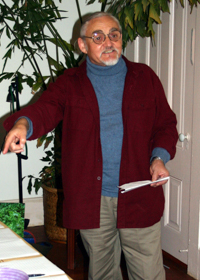
Peter Berg, 2006
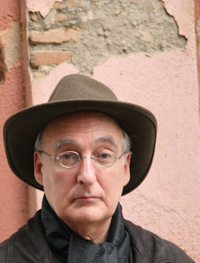
David Zane Mairowitz
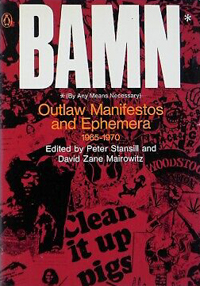
Peter handed David's book to me at the first Planet Drum bundle collating party in
1973.
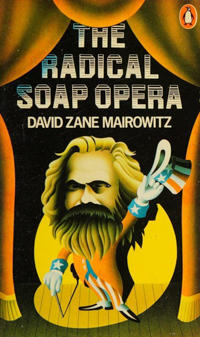
Mairowitz included a chapter on the Diggers in this 1974 book.
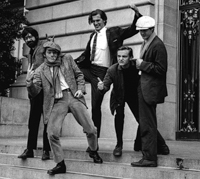
The front-page SF Chronicle (11/30/66) photo of the five Diggers after "public
nuisance" charges were dropped stemming from the Intersection Game on Halloween
1966. Peter is fourth from the left.
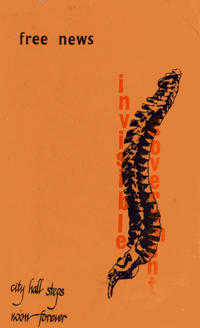
"We occupied City Hall steps every day — reading poems, making proclamations,
giving away free food, bathing in the city fountain. It was a fixture. And it
was called Free City." (1968)
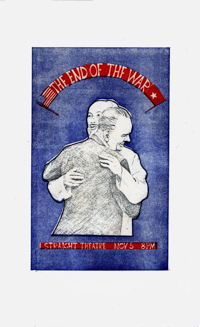
"We had an event in San Francisco, it was called The End of the War. It was done
in late '67. The poster for that, by the way, had Lyndon Johnson with his arms
around Ho Chi Minh, and both of them waving the other one's flag."
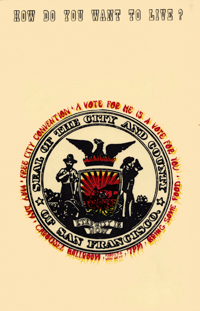
"How do you want to live" (poster announcing the Free City Convention, May 1,
1968, at the Carousel Ballroom)
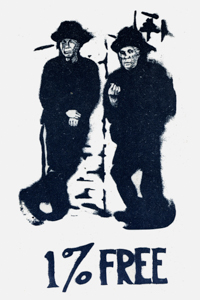
"[The 1% Free poster] was interpreted by the merchants on Haight Street to mean
that they should give one percent of their money [laughs] to the Diggers, which
I love. That's the joy of a provocative title: it can evoke all kinds of
responses."
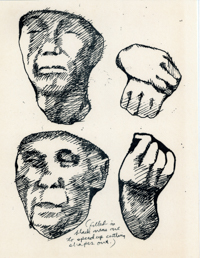
"[The 1% Free poster was] large, at least five feet high and three-feet-plus
across. It's been spray-painted onto a stencil, so that it has a rough
blue-jean, blue-denim look to it. The faces and the hands of the Tong men were
made on a [Gestetner mimeograph machine], and then cut out, and pasted onto the
surface, so that it has a ghostly three-dimensional look."
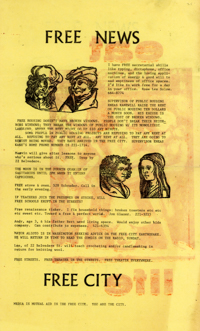
"The Digger style for the '68 period was Free City."
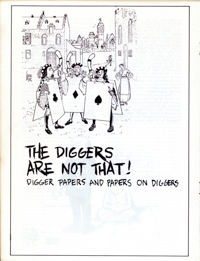
"The Diggers Are Not That" (a common refrain in the underground press)
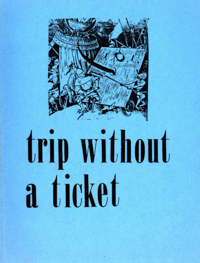
One of the critical texts of the Digger movement, "Trip Without a Ticket"
written by Berg. (1966)
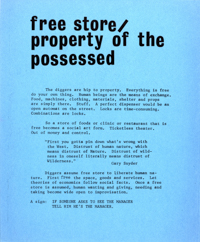
"Everything is free, do your own thing" (the motto that Berg and Grogan coined).
The second half of the phrase eventually entered the American lexicon.
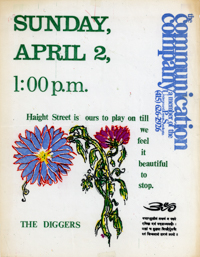
"And [we] designed events for the street that involved the participation of at
least five thousand people — in the middle of Haight Street."
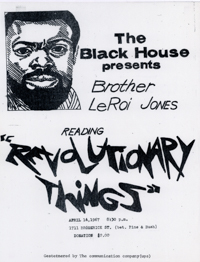
Communication Company street sheet announcing a reading by Leroi Jones (1967)
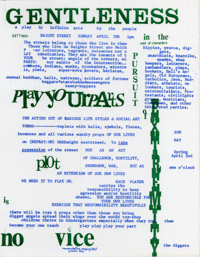
"Gentleness in the pursuit of extremity is no vice" (Digger manifesto on life
acting)
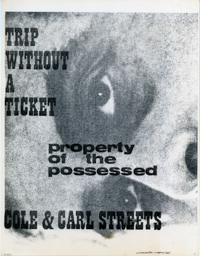
Communication Company street sheet announcing the third Digger free store.
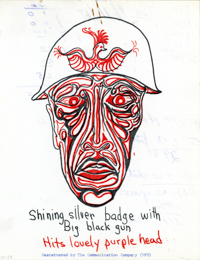
"The police reacted by trying to stop the social upheaval that was happening
there." [in the Haight, 1967-68]
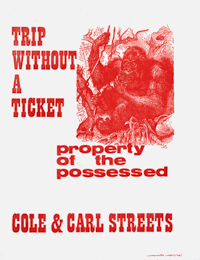
Another announcement for the Trip Without A Ticket free store. (1967)
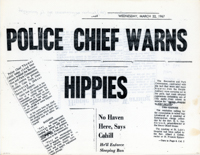
The City Establishment reacted in panic at the prospect of thousands of young
people coming to San Francisco in the summer of 1967.
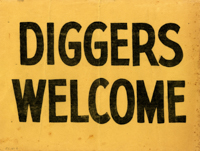
A sign for Digger friendly homes to hand in the window.
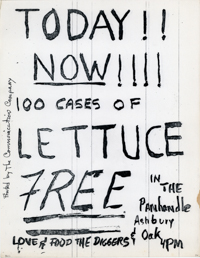
"So 'do your own thing, everything is free' took the form of providing free
food, free shelter, free cultural events, and an opportunity to join in, and
participate, with this kind of lifestyle, which we called Life Acting."
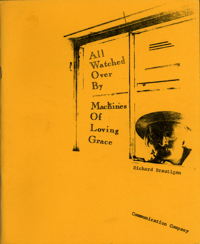
"All Watched Over By Machines of Loving Grace" a compilation of poems by Richard
Brautigan, given away free by the Communication Company. (1967)
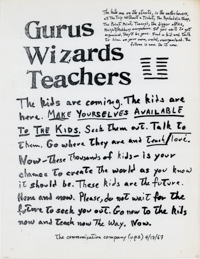
"Gurus Wizards Teacher" street sheet by Chester Anderson of the Communication
Company.
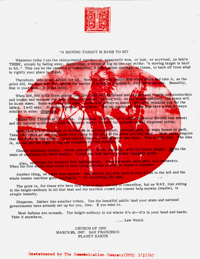
"A Moving Target Is Hard To Hit" by Lew Welch. (Com/Co street sheet, 1967)
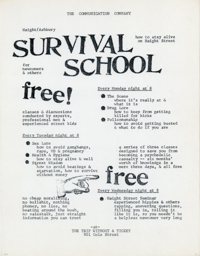
A series of free workshops at the Digger free store. (1967)
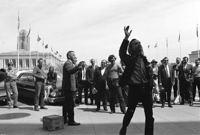
Peter Berg performing at one of the Free City "Noon Forever" events outside SF
City Hall. (1968) [Photo courtesy Chuck Gould]
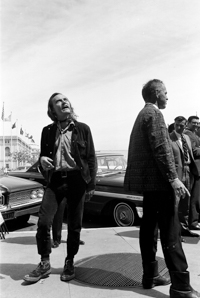
Peter dancing pas de deux with Holy Hubert, the evangelical preacher who
regularly showed up to castigate the hippies and their evil ways. [Photo
courtesy Chuck Gould]
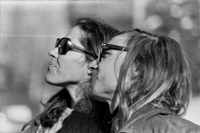
Judy Goldhaft and Peter Berg (longtime partners) [Photo courtesy Chuck Gould]
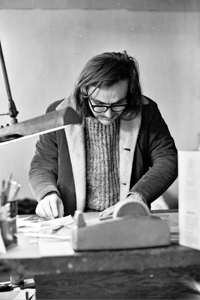
Peter working on the preparation of Free City News in the basement of Willard
Street Commune. [Photo courtesy Chuck Gould]
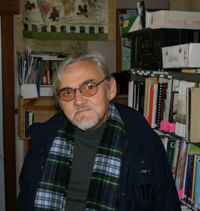
Photo by epn
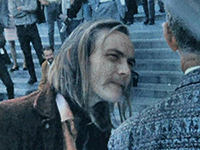
Screenshot from NOWSREAL with Peter Berg interacting with Holy Hubert on City Hall
steps at a Free City Noon Forever rally. (1968)
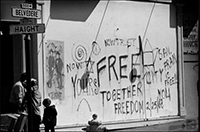
1% Free poster pasted on outside of a Haight Street storefront (1968).
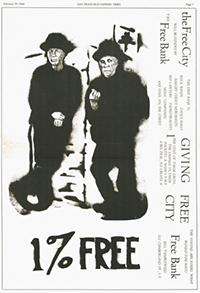
The Free City Bank announcement. (1968)
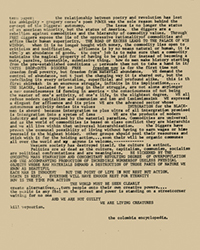
Digger sheet "Term Paper" with reference to Gregory Corso's poem POWER. (1967)
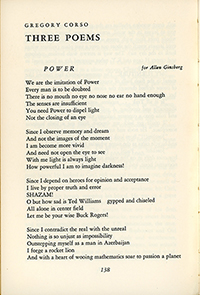
Portion of Gregory Corso's poem POWER (from BIG TABLE_1, edited by Irving
Rosenthal, 1959).
|
